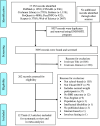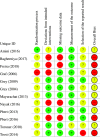School-based interventions for the treatment of childhood obesity: a systematic review, meta-analysis and meta-regression of cluster randomised controlled trials
- PMID: 33745501
- PMCID: PMC9884753
- DOI: 10.1017/S1368980021001117
School-based interventions for the treatment of childhood obesity: a systematic review, meta-analysis and meta-regression of cluster randomised controlled trials
Abstract
Objective: Schools offer an ideal setting for childhood obesity interventions due to their access to children and adolescents. This review aimed to systematically review the impact of school-based intervention for the treatment of childhood obesity.
Design: Eight databases were searched from inception till 30 May 2020. A revised Cochrane risk-of-bias tool and the Grading of Recommendations, Assessment, Development and Evaluations criteria were used to evaluate the risk of bias and overall evidence. Meta-analysis and meta-regression were performed on Stata software using the random effects model. Overall effect was evaluated using Hedges' g, and heterogeneity was assessed using Cochran's Q and I2.
Setting: Cluster randomised controlled trials (cluster-RCT) delivered in school.
Participants: Children and adolescents (6-18 years of age) with overweight and obesity.
Results: Twelve cluster-RCT from seven countries with 1755 participants were included in the meta-analysis. School-based interventions for the treatment of childhood obesity reduced BMI and BMI z-scores with a medium effect (g = 0·52). Subgroup analyses showed greater effectiveness of brief school-based interventions and the interventions conducted in lower-middle to upper-middle economies. Meta-regression assessed the heterogeneity and the final model, with covariates of the type of economies and trial duration, accounted for 41·2 % of the variability. The overall quality of evidence was rated low because of the high risk of bias and inconsistency.
Conclusions: School-based interventions are a possible approach to provide universal healthcare for the treatment of childhood obesity, and further well-designed cluster-RCT with longer follow-up are needed. This study is registered with PROSPERO (CRD42020160735).
Keywords: Adolescent; Children; Obesity; School-based.
Figures
References
-
- Cole TJ & Lobstein T (2012) Extended international (IOTF) body mass index cut-offs for thinness, overweight and obesity. Pediatr Obes 7, 284–294. - PubMed
-
- Juonala M, Magnussen CG, Berenson GS et al. (2011) Childhood adiposity, adult adiposity, cardiovascular risk factors. N Engl J Med 365, 1876–1885. - PubMed
Publication types
MeSH terms
LinkOut - more resources
Full Text Sources
Other Literature Sources
Medical



 ,…
,…  , some concerns;
, some concerns;  , high risk
, high risk 
